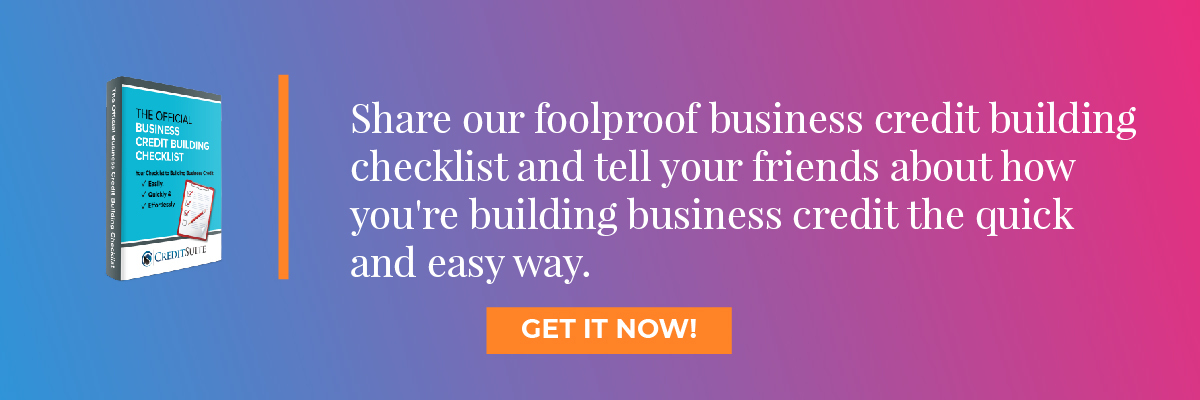- Connect With Us!
- (877) 600-2487
- info@creditsuite.com
How to Build Corporate Credit Effectively
Published By Janet Gershen-Siegel at May 23rd, 2018
We Show You How to Build Corporate Credit Effectively
Do you know how to build corporate credit effectively? We break down just what you need to know and show you what will work.
Building corporate credit means that your company attains opportunities you never felt you would. You can get cutting-edge equipment, bid on real property, and deal with the company payroll, even when times are a bit lean. This is particularly helpful in holiday business enterprises, where you can go for months with solely nominal sales.
Because of this, you need to work on growing your business credit. Enhance and maintain your scores and you will have these possibilities. Do not, and either you do not get these chances, or they will set you back you a lot more. And no business owner wants that. You need to know what affects your company credit before you can make it better.
Share our foolproof business credit building checklist and tell your friends about how you’re building business credit the quick and easy way.
How to Build Corporate Credit Effectively: Credit History Length Matters
This is basically how long your company has been utilizing business credit. Obviously newer businesses will have very short credit histories. Though there is not a lot you can specifically do about that, do not fret. Credit reporting bureaus will also check your personal credit score and your own background of payments.
If your own personal credit is excellent, and particularly if you have a relatively extensive credit history (that is, you did not just get your first credit card not too long ago), then your personal credit can come to the rescue of your company.
Normally the opposite is also true– if your individual credit history is bad, then it will have an effect on your company credit scores until your company and consumer credit can be split.
How to Build Corporate Credit Effectively: Your Payment History is Important
Overdue payments will affect your small business credit score for a good seven years. If you pay your small business (and personal) debts off, as speedily as possible and as completely as possible, then you can make a very real difference when it pertains to your credit scores. Be sure to pay on schedule and you will experience the rewards of punctuality.
How to Build Corporate Credit Effectively: Your Personal Credit Can Influence Your Corporate Credit
Are you having a substandard business year? Then it could wind up on your consumer credit score. And in the event your small business has not been in existence for too long, it will directly have a bearing on your corporate credit. Having said that, you can unlink both by taking steps to separate them. For instance, if you get credit cards only for your business, or you open business checking accounts and other bank accounts (or even get a business loan), then the credit reporting agencies will begin to treat your individual and corporate credit on an individual basis.
Also, be sure to incorporate, or at least file a DBA (doing business as) status. You can also take care of your company’s invoices with your company credit card or checking account, and make certain it is the small business’s full name on the bill and not yours.
How to Build Corporate Credit Effectively: Do not Allow Your Credit Utilization Rate to Harm Your Company
Your credit utilization rate is the amount on credit. It is then divided by your overall available credit. Lenders commonly do not like to see this go above 30%. So for each $100 in credit, do not borrow on in excess of $30 of that. If this percentage is rising, you’ll have to spend down and repay your financial debts before borrowing more.
How to Build Corporate Credit Effectively: The Credit Reporting Bureaus Can Just Plain Get It Wrong
Just the same as each organization out there, credit reporting bureaus just like Equifax and Experian are only as good as their records. If your firm’s name is similar to another’s, or your name is a lot like another small business owner’s, there could be some mistakes. So keep track of those reports, and your small business report at Dun & Bradstreet, PAYDEX.
Remain on top of these reports and question charges with paperwork and clear-cut communications. Do not just let them stay wrong! You can repair this! And while you’re at it, monitor the credit reporting agency which exclusively handles personal and not small business credit, TransUnion. If you do not know exactly how to pull a credit report, do not stress. It’s simple.
Share our foolproof business credit building checklist and tell your friends about how you’re building business credit the quick and easy way.
How to Build Corporate Credit Effectively: The Method
Corporate credit is credit in a corporation’s name. It doesn’t tie to an entrepreneur’s personal credit, not even if the owner is a sole proprietor and the solitary employee of the business.
As a result, an entrepreneur’s business and individual credit scores can be very different.
The Benefits
Since corporate credit is independent from consumer, it helps to secure a small business owner’s personal assets, in case of legal action or business bankruptcy.
Also, with two distinct credit scores, an entrepreneur can get two separate cards from the same vendor. This effectively doubles purchasing power.
Another benefit is that even start-ups can do this. Heading to a bank for a business loan can be a formula for frustration. But building corporate credit, when done right, is a plan for success.
Consumer credit scores rely on payments but also other factors like credit usage percentages.
But for corporate credit, the scores really just depend on if a small business pays its bills timely.
The Process
Establishing corporate credit is a process, and it does not happen without effort. A small business has to proactively work to develop corporate credit.
Having said that, it can be done readily and quickly, and it is much more efficient than developing individual credit scores.
Merchants are a big component of this process.
Performing the steps out of order will lead to repetitive denials. No one can start at the top with corporate credit. For instance, you can’t start with retail or cash credit from your bank. If you do, you’ll get a rejection 100% of the time.
Corporate Fundability
A corporation has to be fundable to lenders and vendors.
As a result, a business will need a professional-looking web site and e-mail address. And it needs to have site hosting from a merchant like GoDaddy.
And also, company telephone and fax numbers ought to have a listing on ListYourself.net.
Additionally, the corporate phone number should be toll-free (800 exchange or the equivalent).
A corporation will also need a bank account dedicated purely to it, and it has to have all of the licenses essential for operation.
Licenses
These licenses all must be in the particular, correct name of the business. And they need to have the same small business address and phone numbers.
So note, that this means not just state licenses, but potentially also city licenses.
Share our foolproof business credit building checklist and tell your friends about how you’re building business credit the quick and easy way.
Dealing with the IRS
Visit the IRS website and get an EIN for the business. They’re free. Pick a business entity such as corporation, LLC, etc.
The corporate entity can help you to minimize risk. And it will make the most of tax benefits.
A business entity will matter when it concerns tax obligations and liability in case of a lawsuit. A sole proprietorship means the owner is it when it comes to liability and taxes. Nobody else is responsible.
Starting Off the Corporate Credit Reporting Process
Begin at the D&B website and obtain a totally free D-U-N-S number. A D-U-N-S number is how D&B gets a small business in their system, to produce a PAYDEX score. If there is no D-U-N-S number, then there is no record and no PAYDEX score.
Once in D&B’s system, search Equifax and Experian’s web sites for the small business. You can do this at fastcs.wpengine.com/reports. If there is a record with them, check it for correctness and completeness. If there are no records with them, go to the next step in the process.
By doing this, Experian and Equifax will have something to report on.
Vendor Credit Tier
First you must establish trade lines that report. This is also known as the vendor credit tier. Then you’ll have an established credit profile, and you’ll get a corporate credit score.
And with an established corporate credit profile and score you can begin to acquire credit in the retail and cash credit tiers.
These kinds of accounts often tend to be for the things bought all the time, like marketing materials, shipping boxes, outdoor work wear, ink and toner, and office furniture.
But first of all, what is trade credit? These trade lines are credit issuers who will give you initial credit when you have none now. Terms are normally Net 30, versus revolving.
So, if you get approval for $1,000 in vendor credit and use all of it, you must pay that money back in a set term, like within 30 days on a Net 30 account.
Details
Net 30 accounts need to be paid in full within 30 days. 60 accounts have to be paid fully within 60 days. In comparison with revolving accounts, you have a set time when you must pay back what you borrowed or the credit you used.
To begin your corporate credit profile the proper way, you need to get approval for vendor accounts that report to the corporate credit reporting agencies. Once that’s done, you can then make use of the credit.
Then repay what you used, and the account is on report to Dun & Bradstreet, Experian, or Equifax.
Vendor Credit Tier – It Helps
Not every vendor can help in the same way true starter credit can. These are vendors that will grant an approval with marginal effort. You also want them to be reporting to one or more of the big three CRAs: Dun & Bradstreet, Equifax, and Experian.
You want 5 to 8 of these to move onto the next step, which is the retail credit tier. But you may have to apply more than once to these vendors. So, this is to verify you are reliable and will pay punctually.
Retail Credit Tier
Once there are 5 to 8 or more vendor trade accounts reporting to at least one of the CRAs, then move onto the retail credit tier. These are service providers such as Office Depot and Staples.
Just use your Social Security Number and date of birth on these applications for verification purposes. For credit checks and guarantees, use the small business’s EIN on these credit applications.
One good example is Lowe’s. They report to D&B, Equifax and Business Experian. They need to see a D-U-N-S and a PAYDEX score of 78 or more.
Fleet Credit Tier
Are there 8 to 10 accounts reporting? Then move onto the fleet credit tier. These are businesses like BP and Conoco. Use this credit to buy fuel, and to repair, and take care of vehicles. Just use your SSN and date of birth on these applications for verification purposes. For credit checks and guarantees, make sure to apply using the small business’s EIN.
One such example is Shell. They report to D&B and Business Experian. They need to see a PAYDEX Score of 78 or higher and a 411 company telephone listing.
Shell may claim they want a certain amount of time in business or profits. But if you already have sufficient vendor accounts, that won’t be necessary. And you can still get approval.
Cash Credit Tier
Have you been sensibly managing the credit you’ve gotten up to this point? Then move onto the cash credit tier. These are companies such as Visa and MasterCard. Just use your SSN and date of birth on these applications for verification purposes. For credit checks and guarantees, use your EIN instead.
One example is the Fuelman MasterCard. They report to D&B and Equifax Business. They want to see a PAYDEX Score of 78 or more. And they also want you to have 10 trade lines reporting on your D&B report.
Plus, they want to see a $10,000 high credit limit reporting on your D&B report (other account reporting).
Also, they want you to have an established corporation.
These are businesses such as Walmart and Dell, and also Home Depot, BP, and Racetrac. These are normally MasterCard credit cards. If you have 14 trade accounts reporting, then these are doable.
Monitor Your Corporate Credit
Know what is happening with your credit. Make certain it is being reported and take care of any mistakes ASAP. Get in the habit of checking credit reports and digging into the specifics, and not just the scores.
We can help you monitor corporate credit at Experian and D&B for only $24/month. See: fastcs.wpengine.com/monitoring.
Update Your Information
Update the relevant information if there are mistakes or the info is incomplete.
Fix Your Corporate Credit
So, what’s all this monitoring for? It’s to challenge any mistakes in your records. Errors in your credit report(s) can be corrected. But the CRAs usually want you to dispute in a particular way.
Disputes
 Disputing credit report inaccuracies usually means you send a paper letter with duplicates of any proofs of payment with it. These are documents like receipts and cancelled checks. Never send the originals. Always mail copies and retain the originals.
Disputing credit report inaccuracies usually means you send a paper letter with duplicates of any proofs of payment with it. These are documents like receipts and cancelled checks. Never send the originals. Always mail copies and retain the originals.
Fixing credit report mistakes also means you specifically itemize any charges you contest. Make your dispute letter as clear as possible. Be specific about the issues with your report. Use certified mail so that you will have proof that you sent in your dispute.
A Word about How to Build Corporate Credit Effectively
Always use credit responsibly! Never borrow beyond what you can pay off. Keep track of balances and deadlines for payments. Paying off on time and fully will do more to raise corporate credit scores than virtually anything else.
Growing corporate credit pays. Excellent corporate credit scores help a small business get loans. Your lending institution knows the company can pay its financial obligations. They understand the small business is for real.
The business’s EIN connects to high scores and credit issuers won’t feel the need to request a personal guarantee.
Corporate credit is an asset which can help your corporation in years to come. Learn more here and get started toward growing corporate credit.
How to Build Corporate Credit Effectively: Building Corporate Credit Works
Once you recognize what affects your company credit score, you are that much nearer to creating better corporate credit. Learn more here and get started with how to build corporate credit effectively.

 " class="attachment-blog-single size-blog-single wp-post-image" alt="Get Business Credit Cards for New Businesses Credit Suite-Business Line of Credit Decoded" title="Get Business Credit Cards for New Businesses">>
" class="attachment-blog-single size-blog-single wp-post-image" alt="Get Business Credit Cards for New Businesses Credit Suite-Business Line of Credit Decoded" title="Get Business Credit Cards for New Businesses">>